Harrisburg PA parking boycott
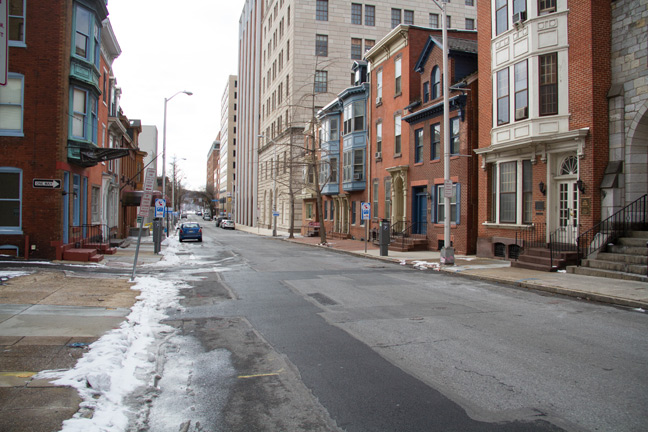
Harrisburg bailout parking scheme shows $3 million revenue shortfall
It’s been a year since the Corbett administration forced the city of Harrisburg through a complex series of refinancings to keep the city and bond creditors out of bankruptcy proceedings.
No aspect of the sweeping bailout has been more noticeable and upsetting to the public than the lease of the city’s parking assets.
To avoid bankruptcy, the city’s 1,250 on-street parking spaces and its 15 parking garages and lots were leased to private financiers for 50 to 75 years in a complex $287 million bond deal -- all to pay back bond creditors for decades of past unrealistic bond deals.
Now the revenue numbers associated with the parking transaction are starting to come in.
In 2014 revenues from this new parking deal were a whopping $3 million short of projections, according to a report released in late January by the Pennsylvania Economic Development Financing Authority (PEDFA), the state agency that nominally floated the tax-free bonds.
Despite this shortfall, to be sure, the bond traders and creditors had their bond service paid in full.
But others, including the city of Harrisburg, and the public, were left holding the empty bag.
A cash-strapped Harrisburg received $200,000 less in 2014 than the $2 million it had been promised from parking operations revenue, a ten percent shortfall.
In reality, these shortfalls were both predictable, and avoidable. It’s now clear that Corbett’s receivership team overstated anticipated revenues in order to make the numbers work on paper, and to facilitate the city bailout of the bond dealers, whose lobbyists made political contributions to Corbett.
A series of bad or even fraudulent assumptions by Corbett’s receivership team continue to make the problem worse.
As was the case with the sale of the city’s troubled incinerator to the Lancaster County Solid Waste Management Authority (LCSWMA), which bought the incinerator at an inflated price, the city’s parking assets were also wildly overvalued before their lease in a myopic effort to keep the city out of bankruptcy court.
Receiver William Lynch’s team conducted no studies to determine the actual market value of the parking spaces and garages, or the cash flow that could reasonably be generated from parking in Harrisburg.
The receiver instead valued the parking assets at $287 million because -- well, that’s the number he needed to make the bailout deal work. The actual market value of the parking assets might have been half or a third of that figure. No one seems to know for certain.
“We had to back into this transaction to solve a crisis, if you will, with the city of Harrisburg,” PEDFA Executive Director Steve Drizos told his board members in January.
In simple words, the numbers were made up, and everybody involved then had to cook up more revenue numbers to justify the bonds to pay for the deal.
PEDFA itself is paying the price, and took in almost $40,000 less in 2014 than it projected, according to the figures released by the agency.
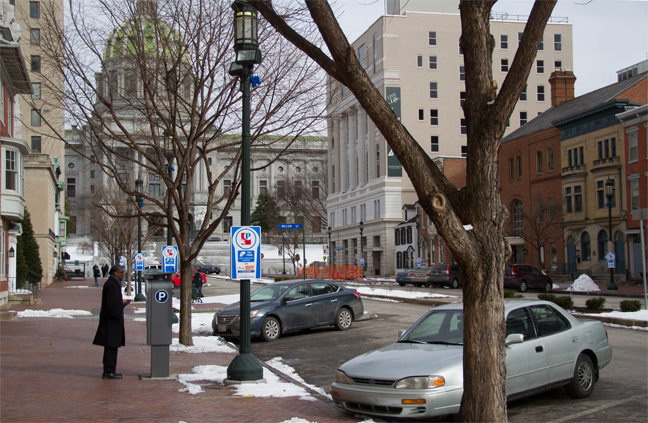 State Street in Harrisburg
State Street in Harrisburg
Parking rates doubled or trebled
But it’s the public that really got the soaking: for every minute on the parking meter.
To make the inflated numbers work to pay off the city’s bond creditors -- which include Dauphin County and bond insurer AGM -- parking fees and fines were more than doubled, if not trebled, from pre-bailout rates.
The receiver’s team simply, but erroneously, assumed that roughly the same number of people who parked their cars at the old rate would continue to park at a grossly inflated rate.
Parking fees in metered spaces doubled from about $1.50 an hour -- from a single quarter for ten minutes at a parking meter -- to $3 dollars an hour. Parking tickets rose from $13 to $30, with the fine increasing to $50 after only four days.
Making matters worse, the old familiar quarter-stuffed parking meters and lazy sauntering meter maids were scuttled, replaced by computerized parking machines that ask the potential parker to punch in his or her car’s license plate number and credit card. The new parking machines are in constant electronic contact with a restless team of highly motivated enforcement officers who unapologetically swoop down and plant a $30 ticket on a car’s windshield the minute after the allotted time has expired.
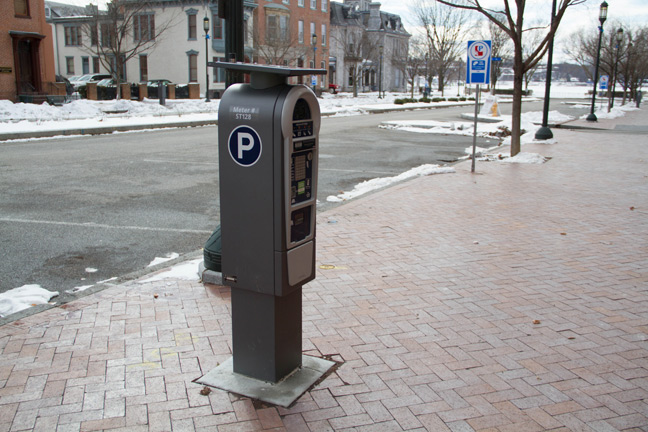
Parking robot presides over empty spaces
The company contracted to handle everyday operations, Standard Parking, soon rubbed salt in the wound by adding a fleet of roving, license plate-reading enforcement vehicles to root out scofflaws and boot cars, or to summon police to arrest those parkers with outstanding warrants.
The hours of parking enforcement were also greatly expanded to further alienate the buying public. Drivers used to be able to parking free in Harrisburg after 5 pm, and on weekends.
Parkers must now pay the $3-an-hour parking fee until 7 pm every weekday evening and on Saturdays, effectively killing the happy hour and Saturday crowd in the city’s once-bustling restaurant row, where businesses now are shuttering.
Even holidays aren’t exempt from the parking fees, and the complicated computerized meters, standing like soulless robot sentinels at every block, seem to regularly malfunction. On Christmas Eve 2014, a Wednesday evening, worshippers at churches downtown were greeted with $30 parking fines when they came out of Christmas mass.
It’s those inflated parking fees, fines, broken meters and draconian policies that are raising the ire of everyday Harrisburgers.
Spontaneous parking boycott
The average Harrisburg resident, historically tight with a penny and described for generations as “Pennsylvania-Dutch cheap,” certainly can’t understand Corbett’s wildly complex bond bailout transactions. But he or she can certainly comprehend when they are being soaked for a parking space.
The upshot is that people by the droves are not parking in city spaces, and are in large numbers angrily engaging in a spontaneous parking boycott in downtown Harrisburg.
Numbers released by PEDFA last week for the first time put numbers on the problem. Metered parking in 2014 took in only about $2.1 million of its projected $2.9 million goal, for a $755,000 shortfall.
That’s hardly a surprise to anyone who can look out a window and see empty parking spaces for blocks before them in downtown Harrisburg.
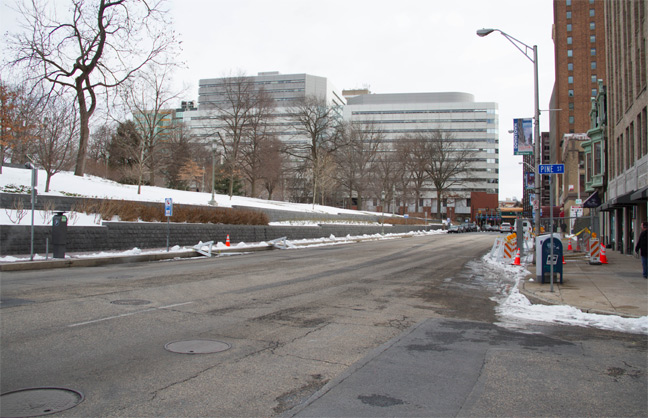
Third Street in front of the state capitol complex
A drive around the city’s downtown at mid-afternoon last Friday told the tale. It once was a challenge to find a weekday parking space in downtown Harrisburg. Now entire blocks stand eerily empty of cars.
In the small, central downtown section of the city, encompassing a block or two around state offices, the streets, in fairness, were relatively full of parked cars. But even here the curbs were dotted with empty spaces, where a year ago it would have been hard to find a space.
Travel just a block or two away from the central district and you are greeted with unbelievable desolation. You can travel entire blocks without encountering a single parked car.
A quarter-mile stretch on Third Street, in front of the tree-lined park surrounding the domed state capitol building, boasted only empty curbs and vacant parking spaces -- no cars at all. I disbelieved my eyes and double-checked that this was still a parking zone. It was. Only, no one wanted to pay to park there.
Pine Street, home of lobbyists, law firms and state associations, boasted a single parked car in two blocks. When I’d worked there, before the bailout, it was almost impossible to find a space on Pine. Now it looked like a street in an abandoned ghost town.
Residents wonder what all this augers for the future of their once-bustling city. With reduced foot traffic -- read customers -- bars and businesses are closing. News of each business closing sparks debate anew. Was it the parking fees that killed that marginal restaurant, or its bad food? The future seems bleak: a reduced customer base and closing businesses must in turn bring less mercantile taxes and fewer revenues to the struggling city. It’s a death spiral.
The numbers released last week by PEDFA bring confirmation to what before had been anecdotal.
One cashier at a boutique tells me the managers of her gift shop, who are desperate for customers, have taken to advising people on Saturdays to park up the block, in spaces reserved on weekdays for state workers. On Saturdays all can park there free. This has become a lifeline to stay afloat. The cashier shows me photos of the desolate block with no cars parked in front of the business where she works. On Sundays, when the parking is free, the block again fills with cars.
State reneges on promises
The total $3 million shortfall in parking revenues includes an unrealized $1.2 million in promised parking leases from the Commonwealth of Pennsylvania for parking spaces for state workers. For some reason those state payments never fully materialized.
To juice the numbers and make the deal fly on paper, the Corbett administration promised to subsidize the financiers by leasing an additional 3,000 parking spaces above the 1,500 spaces the state previously leased for its workers. All told the state would now lease 4,500 spaces for state workers, Corbett’s team promised, at $140 a month per parking space.
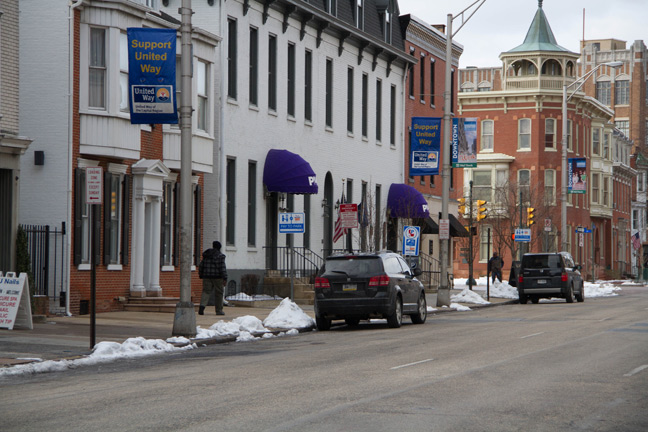
Second Street in Harrisburg: empty spaces, closing businesses
But the state hasn’t leased all those additional spaces. Apparently there aren’t enough ghost workers. The state is also currently laboring under a $2.3 billion deficit. Residents wonder what Gov. Tom Wolf will do. Will Wolf take a pragmatic look at this growing debacle and force a restructuring of the parking transaction? Or will Wolf opt to pour good money after bad to keep things on the present downward trajectory?
The private parking overseers -- who seem to have a remarkable tin ear when it comes to the public and politics -- favor even greater strong-arm tactics on the public to raise revenues.
In 2014, projected “enforcement revenue” from parking tickets and late fees produced only $1.2 million, down from a projected $2.9 million -- or a shortfall of almost $2 million.
John Gass, an executive of Trimont, which manages the parking system, told the PEDFA board that he hoped stepped-up enforcement measures would recapture most if not all of this lost revenue in 2015. But others are skeptical. How much water can be squeezed from a rock, particularly now that potential parkers are painfully aware that stiff fines, car bootings, and arrest warrants await them when they visit Harrisburg, and instead opt to stay away?
The ripple effects are as yet anecdotal. People say they are not renewing memberships at downtown establishments like the Whitaker Center or the State Museum to avoid the inflated parking fees.
Hard numbers not so hard
All told, PEDFA reported a negative cash flow of $61,240 in its Harrisburg parking business for 2014. But this number was reached only when overseers cut planned operating expenses by 20 percent, at a $1.1 million savings. Gass, Trimont’s director, suggested other accounting tricks like “gap accounting” and accrual expenses could, at least on paper, wipe out the $61,240 loss and make it a wash.
So even as the hard numbers come in, overseers want us to know they’re not that hard.
Throughout this slow-motion crisis of cooked books and empty spaces, the private parking executives and even the administration of newly elected Harrisburg Mayor Eric Papenfuse have shown an amazing indifference to all these obvious problems and complaints affecting the public.
At one PEDFA meeting in January some board members openly expressed concern that the fees and fines could be driving visitors away from the city.
Drizos, PEDFA’s executive director, told board members he would entertain no changes, and left no doubt about who was now in charge. “We have to, by all means, protect the integrity of the bond issue,” he told his board.
No one seems interested in protecting, or is empowered to protect, the public, or the city.
With the once-public parking system now effectively in the hands of private financiers, elected officials are telling the public they are powerless to do anything about it.
That’s perhaps the greatest problem now faced by a city that has been pushed to tortured lengths to pay off its bond creditors and avoid bankruptcy, at all costs.
With a stroke of a pen by Corbett’s bailout team, Harrisburg was transformed from a place welcoming to visitors, to a place where potential visitors feel persecuted, a city which some now want to avoid at all cost.
And that can’t be good for business.
- Bill Keisling
posted February 7, 2015